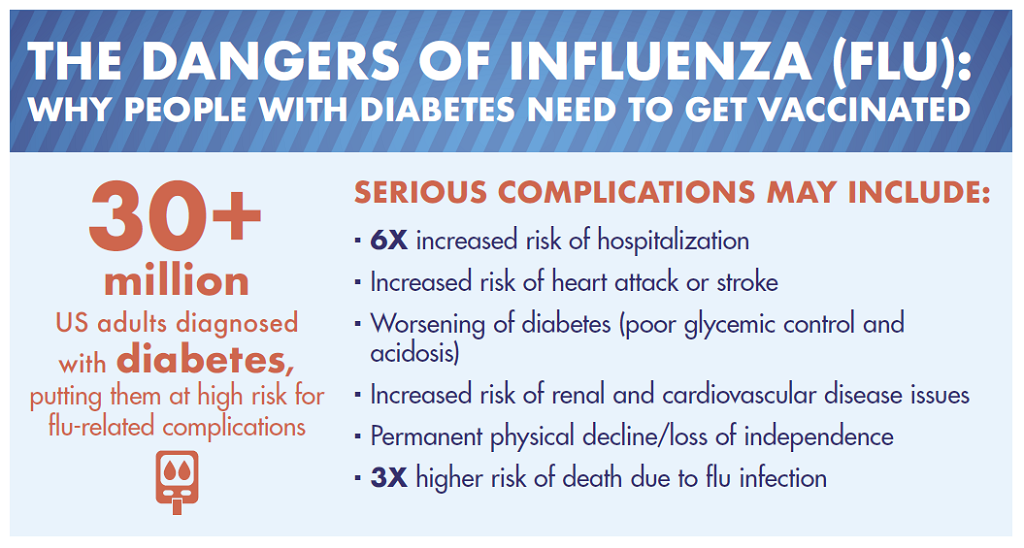
Share On Social!
You may be one of the 42.9 million people who got the flu last season. Perhaps you were among the over 645,000 people hospitalized due to the flu.
Or maybe you even knew one of the 61,200 people who died from flu-related causes, according to CDC estimates.
Today, health experts are bracing for the next flu season.
Flu activity in the U.S. begins around October and runs through May, so now is the time to get your flu shot!

“We know it isn’t perfect, but we need to emphasize the importance of partial protection,” says Dr. William Schaffner, director of the National Foundation for Infectious Diseases. “If you get the shot and you still get the flu, you are less likely to get pneumonia, less likely to be hospitalized and less likely to die.”
This is especially important for Latinos, who are more at risk for type 2 diabetes, obesity, and cardiovascular diseases. When combined with the flu, each of these issues can be deadly.
That’s why the National Hispanic Medical Association (NHMA) has created a toolkit with adult vaccine information!
Latinos with Chronic Diseases: Vaccinations vs Complications
Throughout the past decade, racial and ethnic differences in childhood vaccinations have greatly decreased. In fact, from 2018 to 2019, Latino children had the second highest rate of flu vaccinations than any other racial/ethnic group!
But there’s still bad news.
Latinos were 26% less likely than their white peers to have gotten an influenza vaccine shot. That’s the lowest vaccination rate among racial/ethnic groups.

The NHMA’s new toolkit specifically addresses adults, containing resources for both patients and health providers. According to the NHMA website, it aims to do two things:
- Develop a health communications campaign to increase [vaccination] awareness and knowledge.
- Encourage the administration of influenza vaccines to Hispanic patients with diabetes and cardiovascular disease.
Living with a chronic disease like diabetes requires many different kinds of maintenance. Patients have to regularly take medicine, monitor their blood pressure and sugar levels, choose healthy meals, and more.
Keeping up with vaccinations can seem like an extra chore, but the flu can create many serious complications. For example, the common flu can make it harder to control your blood sugar levels.

It can also impact your heart.
“We found that you’re six times more likely to have a heart attack during the week after being diagnosed with influenza, compared to the year before or after the infection,” says Dr. Jeff Kwong, an epidemiologist with the Institute for Clinical Evaluative Sciences and Public Health Ontario in Canada.
Health Providers: Take a Stand

Help your patients get a head start on their health this flu season!
Take note of how the flu can impact different chronic conditions, and keep a special eye out for Latino adults. NHMA’s toolkit includes many resources for customizing your vaccine reminder system to address these vulnerable groups.
Here are recommendations from the CDC’s National Vaccine Advisory Committee:
- Provide vaccine assessments at every visit: Stay up-to-date on immunization recommendations by regularly visiting the CDC website. Routinely review the vaccination needs of all patients. Then, adapt and implement policies/protocols to help remind patients about the vaccines they need.
- Provide a strong, clear immunization recommendation: First, talk about why vaccines are necessary. Answer questions and concerns from your patients, and explain the potential costs of getting sick.
- Administer or refer vaccine: Offer the vaccines you stock, and refer patients to local providers if the needed vaccines are not stocked.
- Document vaccinations: Participate in the electronic immunization registries offered by each state. Follow up to confirm that patients have received the needed vaccines.
“Your role in ensuring your patients are protected against the flu is crucial,” says Dr. Elena Rios, President and CEO of NHMA.
Learn more about vaccines and how to survive the flu season!
Explore More:
AccessBy The Numbers
142
Percent
Expected rise in Latino cancer cases in coming years



